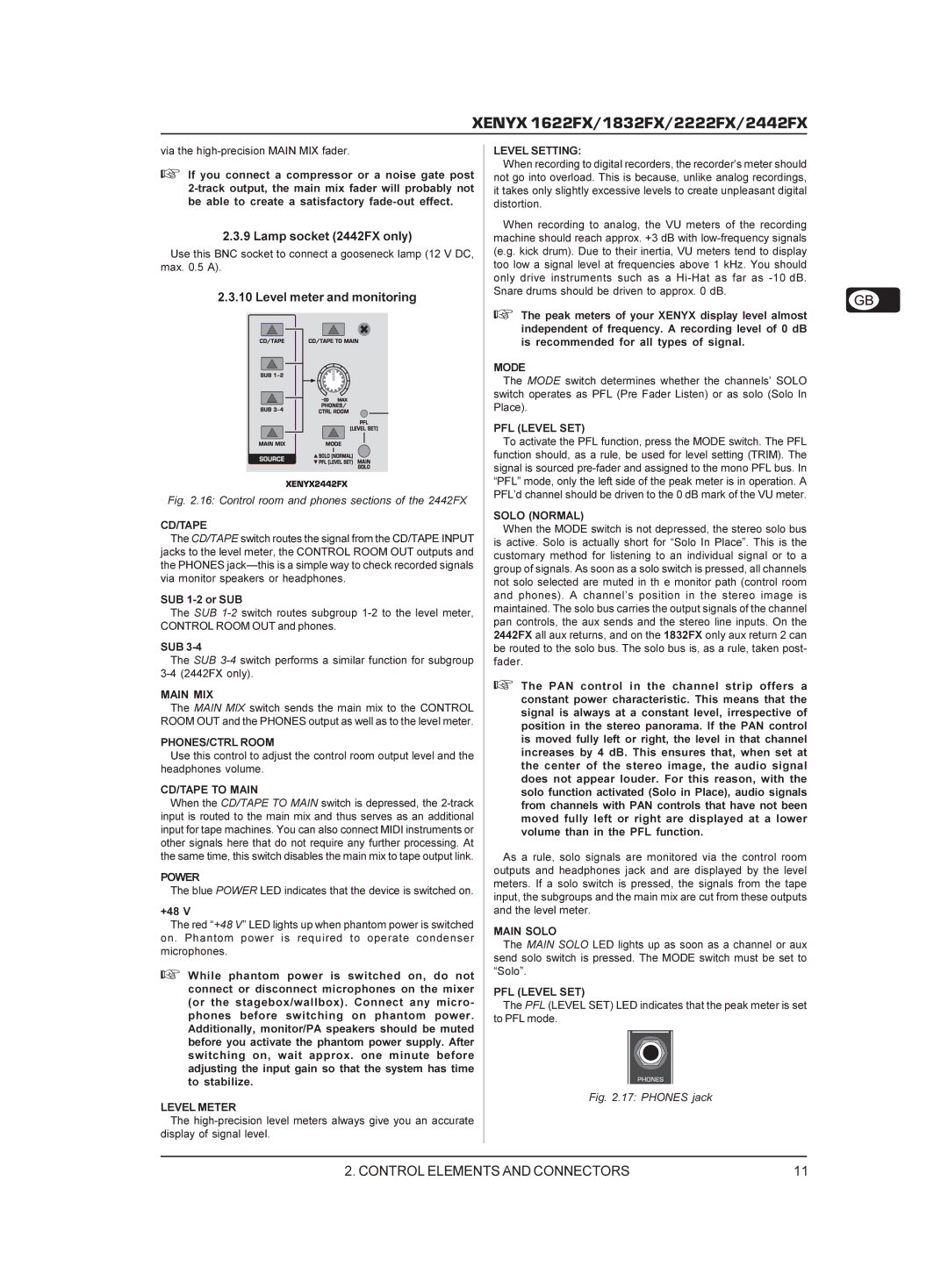
XENYX 1622FX/1832FX/2222FX/2442FX
via the
+If you connect a compressor or a noise gate post
2.3.9 Lamp socket (2442FX only)
Use this BNC socket to connect a gooseneck lamp (12 V DC, max. 0.5 A).
2.3.10 Level meter and monitoring
Fig. 2.16: Control room and phones sections of the 2442FX
CD/TAPE
The CD/TAPE switch routes the signal from the CD/TAPE INPUT jacks to the level meter, the CONTROL ROOM OUT outputs and the PHONES
SUB
The SUB
SUB
The SUB
MAIN MIX
The MAIN MIX switch sends the main mix to the CONTROL ROOM OUT and the PHONES output as well as to the level meter.
PHONES/CTRL ROOM
Use this control to adjust the control room output level and the headphones volume.
CD/TAPE TO MAIN
When the CD/TAPE TO MAIN switch is depressed, the
POWER
The blue POWER LED indicates that the device is switched on.
+48 V
The red “+48 V” LED lights up when phantom power is switched on. Phantom power is required to operate condenser microphones.
+While phantom power is switched on, do not connect or disconnect microphones on the mixer (or the stagebox/wallbox). Connect any micro- phones before switching on phantom power. Additionally, monitor/PA speakers should be muted before you activate the phantom power supply. After switching on, wait approx. one minute before adjusting the input gain so that the system has time to stabilize.
LEVEL METER
The
LEVEL SETTING:
When recording to digital recorders, the recorder’s meter should not go into overload. This is because, unlike analog recordings, it takes only slightly excessive levels to create unpleasant digital distortion.
When recording to analog, the VU meters of the recording machine should reach approx. +3 dB with
+The peak meters of your XENYX display level almost independent of frequency. A recording level of 0 dB is recommended for all types of signal.
MODE
The MODE switch determines whether the channels’ SOLO switch operates as PFL (Pre Fader Listen) or as solo (Solo In Place).
PFL (LEVEL SET)
To activate the PFL function, press the MODE switch. The PFL function should, as a rule, be used for level setting (TRIM). The signal is sourced
SOLO (NORMAL)
When the MODE switch is not depressed, the stereo solo bus is active. Solo is actually short for “Solo In Place”. This is the customary method for listening to an individual signal or to a group of signals. As soon as a solo switch is pressed, all channels not solo selected are muted in th e monitor path (control room and phones). A channel’s position in the stereo image is maintained. The solo bus carries the output signals of the channel pan controls, the aux sends and the stereo line inputs. On the 2442FX all aux returns, and on the 1832FX only aux return 2 can be routed to the solo bus. The solo bus is, as a rule, taken post- fader.
+The PAN control in the channel strip offers a constant power characteristic. This means that the signal is always at a constant level, irrespective of position in the stereo panorama. If the PAN control is moved fully left or right, the level in that channel increases by 4 dB. This ensures that, when set at the center of the stereo image, the audio signal does not appear louder. For this reason, with the solo function activated (Solo in Place), audio signals from channels with PAN controls that have not been moved fully left or right are displayed at a lower volume than in the PFL function.
As a rule, solo signals are monitored via the control room outputs and headphones jack and are displayed by the level meters. If a solo switch is pressed, the signals from the tape input, the subgroups and the main mix are cut from these outputs and the level meter.
MAIN SOLO
The MAIN SOLO LED lights up as soon as a channel or aux send solo switch is pressed. The MODE switch must be set to “Solo”.
PFL (LEVEL SET)
The PFL (LEVEL SET) LED indicates that the peak meter is set to PFL mode.
Fig. 2.17: PHONES jack
2. CONTROL ELEMENTS AND CONNECTORS | 11 |
